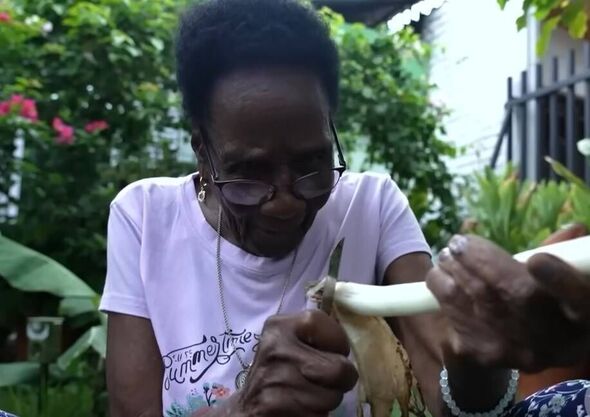A woman has attributed her astounding 123-year lifespan to two staple foods she regularly enjoys. María Antonia Cuero, who holds an identity card indicating her birth in October 1901 – a full 13 years before the outbreak of World War I – could potentially be the world’s oldest living person.
This would surpass the current Guinness World Record held by Jeanne Louise Calment from France, who lived to the age of 122. However, despite the impressive claim on her ID, official verification is still pending, which means she hasn’t yet received global recognition for her longevity.
Nonetheless, in Colombia, she was recently celebrated by friends, family, and even the National Police of Cali during her latest birthday festivities. Her remarkable age has garnered a lot of attention, and she shared insights into her long life on the TV programme Los Informantes. While daily routine, exercise, and her perspective on life all play a role, she particularly emphasised the importance of two foods.
Fish
Regarding fish, she described her upbringing with nine siblings in Mayorquín, Buenaventura, where she would catch and prepare her own meals. She shared: “Good fish. I would fry the fish and then mix it with coconut and rice.”
This aligns with numerous studies, such as one conducted in 2023 by the Harvard School of Public Health and the University of Washington over 16 years on 2,692 senior adults, underscoring the link between fish consumption – a rich source of omega-3 fatty acids – and longevity.
Furthermore, the specific omega-3 DHA, predominantly found in oily fish as well as other seafood, is associated with a 40 percent risk reduction in death from coronary heart disease according to findings also endorsed by the British Heart Foundation.
Not only for physical health, but omega-3 also appears advantageous for mental well-being, with Dr Jacob Teitelbaum noting: “Getting enough omega-3 is critical for helping depression and other emotional disorders.”
Bananas
During a discussion about her dietary preferences, Maria also expressed her particular likeness for bananas, specifically mentioning: “The bocadillo bananas. The small ones.”
These bananas, also known as sugar or lady finger bananas common in Venezuela, are cherished for their sweetness and appealing texture.
Reflecting on longevity secrets in a documentary, the reporter highlighted that Maria formerly credited frequent laughter and minimal worry, an outdoor lifestyle with ample walking, consumption of fresh fish, and engaging in swimming and rowing as her formula for a prolonged life. When asked about her fears, Maria confidently responded: “I am not afraid of anything anymore.”
According to dietitian Juliette Kellow and nutritionist Dr Sarah Brewer, incorporating bananas into your diet on a regular basis can potentially increase your lifespan. They attribute this to the potassium content, which they claim helps protect against high blood pressure by counteracting the effects of sodium in the body and reducing the risk of kidney cancer.
In their book, Eat Better Live Longer – Understand What Your Body Needs To Stay Healthy, they wrote: “Whether you like your bananas slightly green or freckly, they all come with triple levels of mood-boosting powers.
“They are good sources of carbohydrates [fuel for the brain and muscles], and of tryptophan and vitamin B6 [both of which are needed for production of feel-good chemicals]. What’s more, bananas improve digestion and may help regulate blood pressure. Bananas will ripen at home – if you want to speed up the process, keep them in a bunch or with other fruits.”
The experts recommend consuming three to four bananas per week.
María Antonia Cuero
With eight children, 26 grandchildren, 24 great-grandchildren, and 54 great-great-grandchildren, María attributes her long life to a combination of factors, including her love of laughing, not worrying, spending time outdoors, walking, swimming, and rowing, in addition to her fondness for her favourite foods.
Clinical immunologist and director of the Centre for Research and Innovation in Health of Coosalud (CIISA), Dr Juan Manuel Anaya, opened up to El Tiempo about the remarkable woman’s case. He stated: “She is not yet in the Guinness World Records because the work has not been done for the world to know about this case.”
However, Dr Anaya confirmed that steps are being taken to bring this extraordinary story to global attention.
